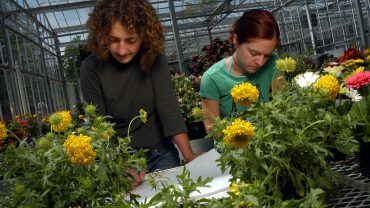Horticultural Science
The online Master of Horticultural Science is a non-thesis degree designed to provide students with an in-depth understanding of horticultural science and practices. This degree encompasses a broad range of topics including fruits, vegetables, nursery and floriculture crops and cross-commodity areas such as plant breeding, weed science, urban horticulture, sustainable agriculture, postharvest physiology and landscape design.
Eligibility
To be admitted to the Master of Horticultural Science program, you must have an undergraduate degree from an accredited institution. Those interested in the Master of Horticultural Science program should ensure they meet the following qualifications:
- Background courses (calculus, physics, general chemistry, organic chemistry)
- Biology courses (botany, plant pathology, entomology, soils, genetics, biochemistry, plant physiology)
- Horticulture science or landscape horticulture courses (in your area of interest)
- GPA of 3.0 or better
- For those with non-native English, minimum TOEFL scores of:
- Internet exam: 80 or better
- Computer exam: 213 or better
- Paper exam: 550 or better
A GPA of at least 3.0 for both the degree requirements as well as for all graduate coursework at NC State is required for graduation. All degree requirements must be completed within six calendar years, beginning with the date the student takes courses carrying graduate credit applicable to the degree program. Students must be continuously enrolled for the duration of their program.
Graduate Planner/Graduate Degree Audit
The Master of Horticultural Science degree requires a minimum of 36 credit hours of approved courses. With the help of an advisor, students form a graduate committee and a Graduate Planner/Graduate Degree Audit. Students must complete a comprehensive project, the subject of which will be determined by the student and their advisor. Students will also have the opportunity to complete teaching and outreach experiences. At the end of the program, students must pass an oral examination.
Course requirements and recommendations are as follows:
- A minimum of 20 hours must be at the 500-700 level.
- At least four but no more than six hours of HS 693 (Master’s Supervised Research) are required.
- Two credits of HS 601 (Seminar Techniques and Technology) are required.
- Up to 12 hours of 400-level courses can be taken as part of the Master of Horticultural Science program; however, only six hours of horticultural science 100-level courses are allowed.
- Students are encouraged, but not required, to fulfill four credits of the horticultural science core course requirement (HS701-707, HS 717).
- Non-thesis Master’s Examination (HS 690) and Non-thesis Master’s Continuous Registration (HS 688 and HS 689) may NOT be used to satisfy credit hour requirements.
Students are allowed, even encouraged, to take courses from departments other than horticultural science. Horticulture science is one area of a broad range of interconnected fields including soil science, plant biology, crop science, entomology, plant pathology, statistics, agricultural economics, agricultural engineering and agricultural education.
When possible, we encourage Master of Horticultural Science online and distance education students to take courses on campus for one semester, ideally during the fall semester, when they can take HS 601 along with other incoming graduate students. The on-campus experience enables online and distance education students to get to know their faculty advisors and committee members, interact with other graduate students and faculty in the department, and enhance the overall graduate experience.
Students pursuing the Master of Horticultural Science degree may choose a minor, but this is not required. The thesis research credit is not permitted in this program unless approved by an associate dean of the Graduate School in cases where the student was initially enrolled in a thesis program but later transferred to a non-thesis program. Students who are enrolled in or have completed the Graduate Certificate in Horticultural Science may wish to count their earned credits toward a Master of Horticultural Science degree. To transfer credits from the certificate program to the master’s degree, the following conditions must be met:
- The course number must be at the 500 level or higher.
- The course must be letter-graded.
- The student must have earned a B or better in the course.
Completing the Master of Horticultural Science Online and Distance Education Program
When all requirements (except completion of the coursework in the final semester) are satisfied, the director of graduate programs submits to the Graduate School the request for a permit to schedule the master’s oral examination. If Graduate School requirements are met, the request will be approved by the Graduate School within 10 working days of receipt of the request. The final examination is then scheduled and conducted, either in person or via video conferencing programs.
After the final examination, the horticultural science graduate administrative assistant will submit a final examination report to the Graduate School within five working days of the examination. The deadline date for unconditionally passing the final examination in order for the student to graduate in a given semester or summer session appears in the Graduate School calendar.
Career Prospects
Graduates possess deep knowledge in the sub-fields of their choice, including soil science, plant biology, crop science, entomology, plant pathology, statistics, agricultural economics, agricultural engineering and agricultural education. Whether you want to open and operate a greenhouse or run a plant breeding laboratory, the Master of Horticultural Science offers the opportunity to grow your expertise in the area most applicable to your horticulture science career path.
Horticultural science continues to grow as an industry. Those interested in the greenhouse, crop science and other aspects of the agricultural side of the industry know that both sustainability issues and the need for sufficient crops to feed a growing world population drive the need for plant, soil and crop experts. Likewise, demands for green space and aesthetically pleasing design have impacted the need for urban planning, landscaping and arbor experts. Advance your career as a horticulture professional with the online Master of Horticultural Science from NC State.

